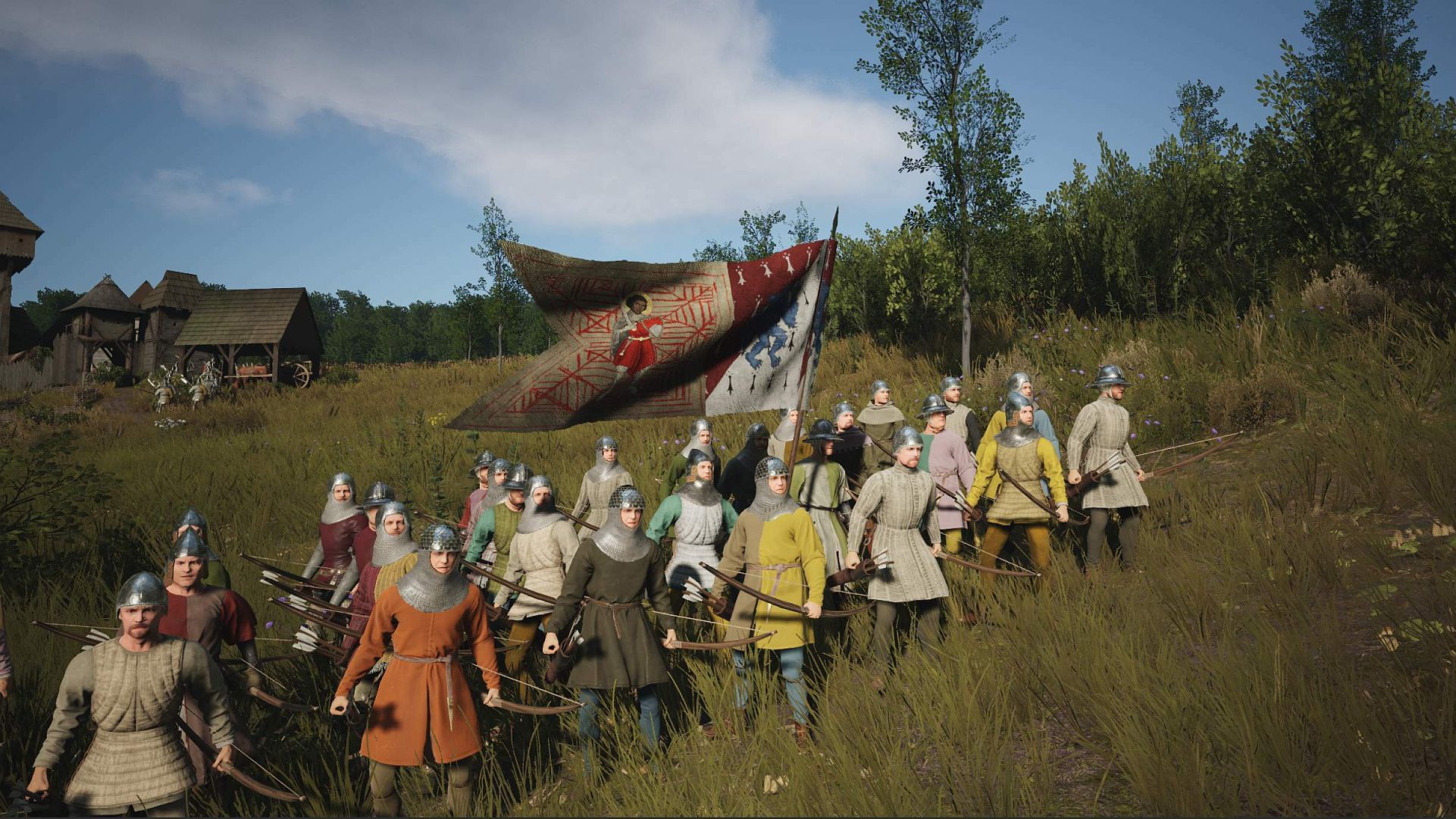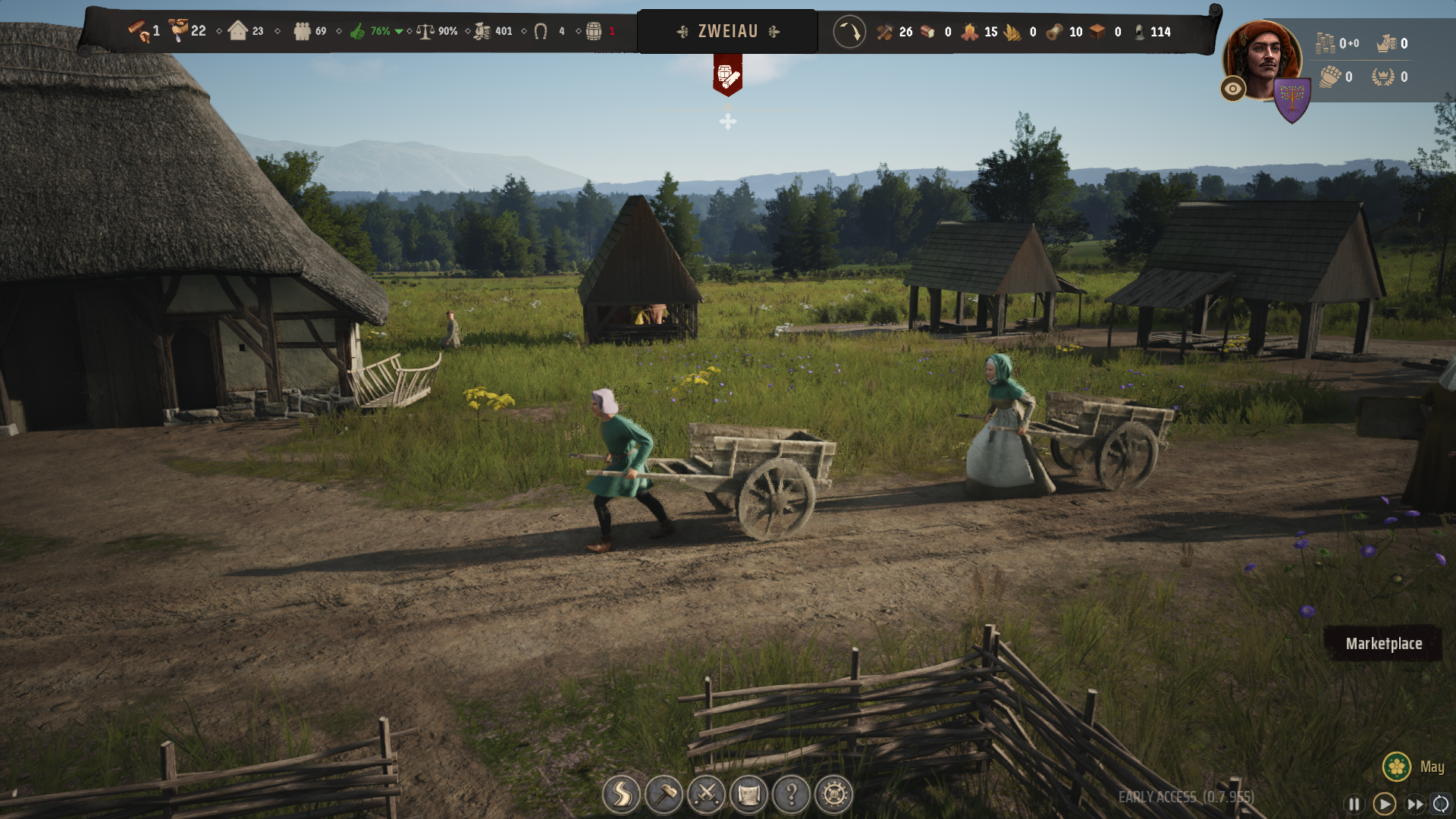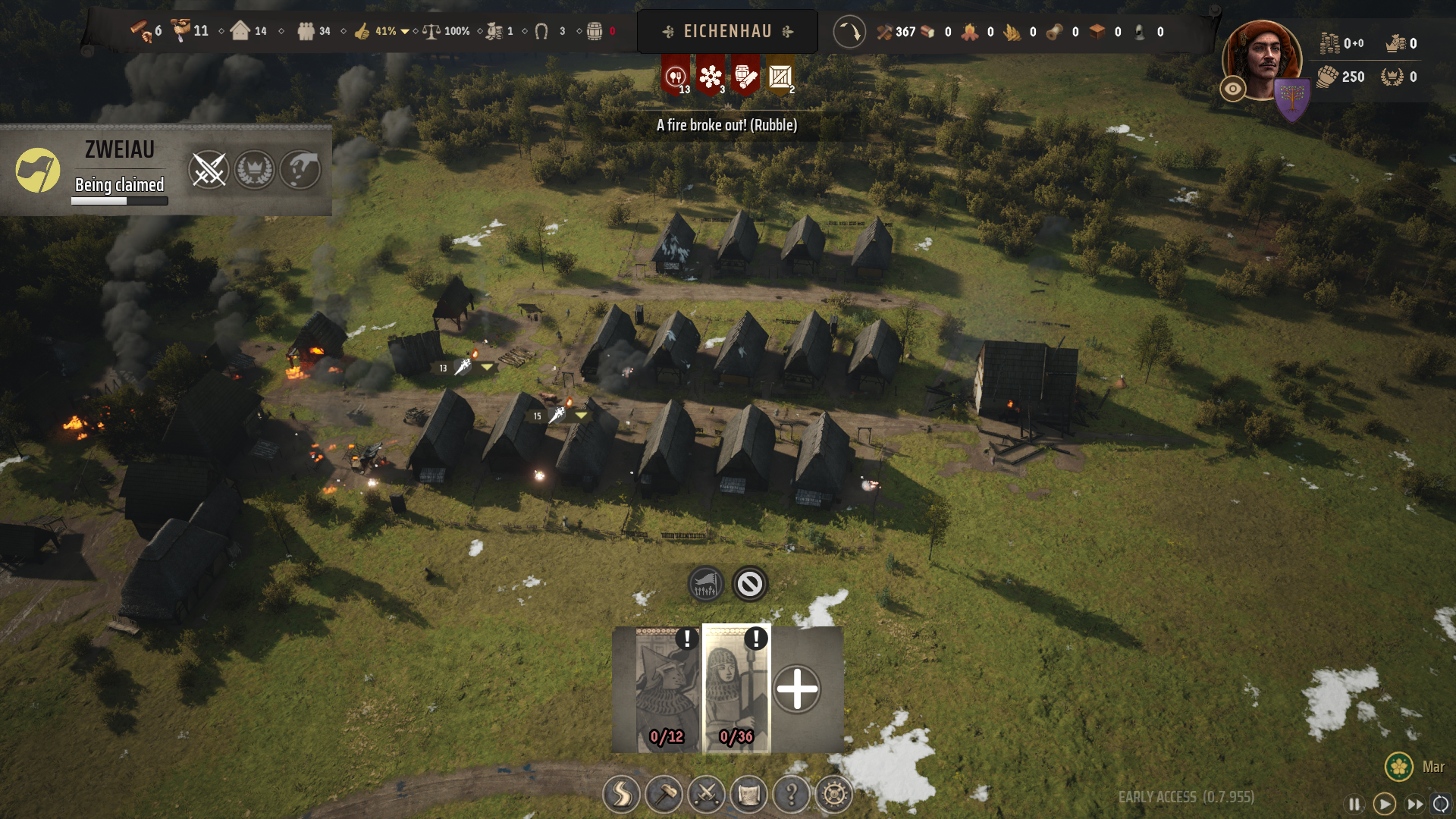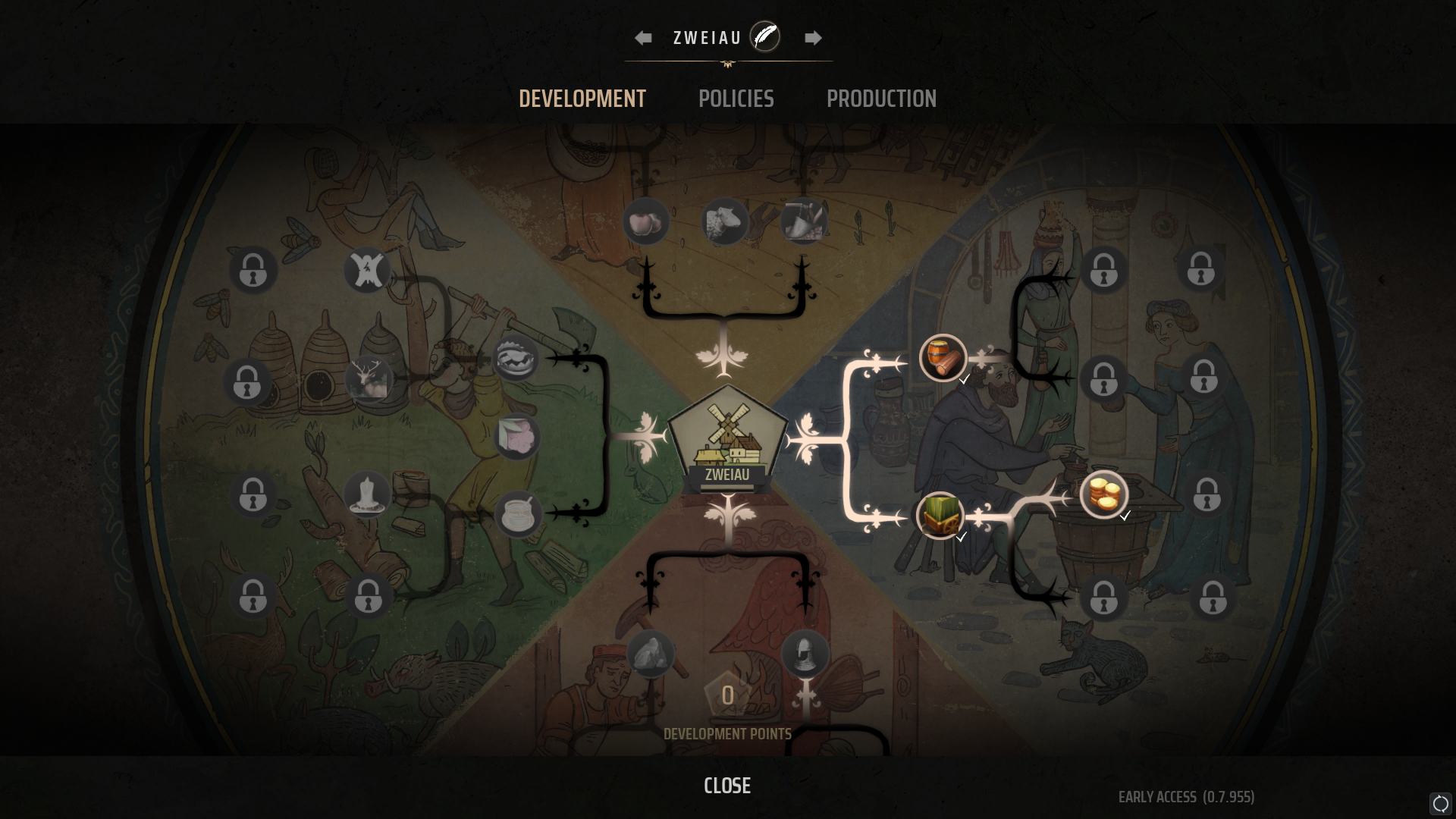
My people are cold and hungry and as far as I can tell, they don't seem too happy to be part of my grand experiment. I'm trying to prove it's possible to complete Manor Lords by harvesting only one resource: wood. That means no farms, no chicken coops, or vegetable gardens. Nor any iron mines, clay pits, or stone quarries. I'm not even collecting firewood.
However, rather than excitement at the prospect of proving you can lean on this medieval city builder's trade network to source everything you need to grow a thriving town, my people’s morale is worryingly low. They may have heard that my previous efforts have twice ended in ghost towns of starved bodies and bandit-burned buildings, but progress demands sacrifice.
The immediate challenge is keeping my people fed and warm. Food and firewood are plentiful for starting towns; you just need to build a woodcutter’s lodge or hunting camp and send your people out for kindling and venison. But because I’m not allowing myself to harvest those resources, I must find a new source.
A cut above

The only way to get what I need is to cut down trees at a logging camp, turn them into planks at the saw pit, and sell them through the trading post to earn money to import everything I can’t source locally. Food and firewood are both for sale at the trading post, but they have an extortionate import tax. I get two coins for every plank I sell, whereas it costs 12 to import a single piece of meat. With five hungry villagers, I need to sell thirty planks every month just to keep them fed. In my first attempt, my people were just about earning enough when I got a hard lesson in market forces, and it was the death of them.
As any member of the upper classes will tell you, there are ways around taxes.
In Manor Lords, the value of goods fluctuates based on what's being traded. Because I was flooding the market with planks, their value dropped to a single coin before traders refused to buy them at all. The people of Village One died hungry and with a storehouse piled high with unsellable wood. For this wood-only town to survive, I'm in a race to find another source of income before the market for planks collapses and my people run out of money to buy food. Thankfully, I can get a little more time; as any member of the upper classes will tell you, there are ways around taxes.
As you grow your towns in Manor Lords, you earn development points – powerful upgrades that unlock passive perks or advanced buildings. One of these, Foreign Suppliers, lets you add stalls to your town marketplace where villagers can buy bread and firewood without paying import duties. So long as I have money, my people will pick up the necessities at cut-rate prices. It’s not enough to thrive, but it will stop them from starving.
You're awarded your first development point after constructing a few houses, which is easy enough as they only require wood to build. If there's one thing I've got, it's wood. And dead villagers, but also wood. To earn any more, however, I'll need to upgrade the homes, and I can only do that when the occupants have access to a whole spread of resources I can't get locally. While my people are no longer in imminent threat of starving, I've not actually solved the problem of the market for planks crashing; the market stalls just mean the money I earn will go further. There's a bigger worry, too: at the end of year two in Manor Lords, bandits will attack my territory. They will steal anything that's not nailed down and burn everything that is–which was the sorry fate of Village Two.
Tricks of the trade

Normally, the best way to prepare for the bandit assault is to construct a manor house. The administrative building is home to your lord and lets you tax your people. It also comes with a retinue of five heavily armed soldiers. Alongside a militia of villagers armed with spears, this force can fend off the bandits. The problem, as my second village discovered, is that the retinue are hungry, hungry boys and a trickle of bread from the market isn't enough to sustain them. By the time the bandits arrived, the soldiers had starved to death in the manor. The bandits carved straight through the emaciated spearmen I could muster and burned my village to the ground.
My wood-only economy can't support a retinue, at least not until I have a more abundant food supply. Until then, I need to recruit another militia unit. For that, I need more weapons, which are currently too pricey to import at the market. Village Three has a path to victory, but it is difficult. I need to diversify my economy before the market for planks collapses, and also raise a larger army. The solution to both my problems, I hope, lies in artisans.
Houses in Manor Lords are more than just homes for your population. If you satisfy your people’s needs, you can upgrade their dwellings into artisan businesses, such as tailors or blacksmiths, producing high-value goods like leather shoes and armor. Or, for my purposes, a fletcher who can turn planks into warbows. With bows, I can arm archers to fight off the bandits and sell all the excess weapons at the trading post. Plus, if I can upgrade enough of my homes, I can unlock the Better Deals development upgrade that removes import taxes entirely, making all the resources I can’t produce locally more affordable. That’s the path to a sustainable town, but I can only hope to reach it by surviving the bandits and the market crash.
Standing between me and this bow-filled future are my people’s wants. Before I can upgrade their homes, they need a steady supply of multiple foods, a nearby church, and linen to make clothes. Or, rather, they need to think they have those things. If I import a stack of goods from other towns and have all the resources in the marketplace simultaneously, there will be a brief window when it appears I can support artisan businesses. If I pause the game at that moment, I can upgrade as many houses as possible to level two and then turn them into artisan businesses.

Between the gold I’ve made from selling planks and the stock waiting in the trading post, I will have enough for the goods I need. However, the value of planks has already dropped to one gold per unit, so collapse can’t be far away. I put in the order for meat and cloth. To my horror, I realize I've not yet built a church. If the goods get to market before the villagers have a place to worship, I won’t be able to upgrade my homes. I unassigned all my workers from their jobs and set them to building the church.
The building's skeleton begins to emerge from the ground as traders on mules approach my town. If this were an action movie, the camera would follow a lit fuse on its way to bundles of dynamite, whereas I am actually watching a man in a hemp robe walking a wheelbarrow up a dirt track. I swear it's equally intense. The final planks are nailed into the church just as the market stalls start stocking the meat and linen. I hammer the pause button and find the houses I can upgrade.
Within minutes, I have three fletchers churning out bows and kitting out my villagers, making them ready to face the incoming bandits. Excess weapons are sold at the market, earning the cash to buy the goods I need to upgrade more houses – enough to unlock the Better Deals ability. At this point, with my town producing valuable commodities and with a route to cheap goods secured, it faces no greater challenge than a regular town in Manor Lords. My wood-only experiment is a success, and it only took the utter and complete failure of two previous attempts to do it. My people should have never doubted me. Except for the people of the first two villages; they were right to be concerned.
If you're not looking to create your own wild scenarios in Manor Lords, perhaps one of the other games on our list of the best strategy games will do.








